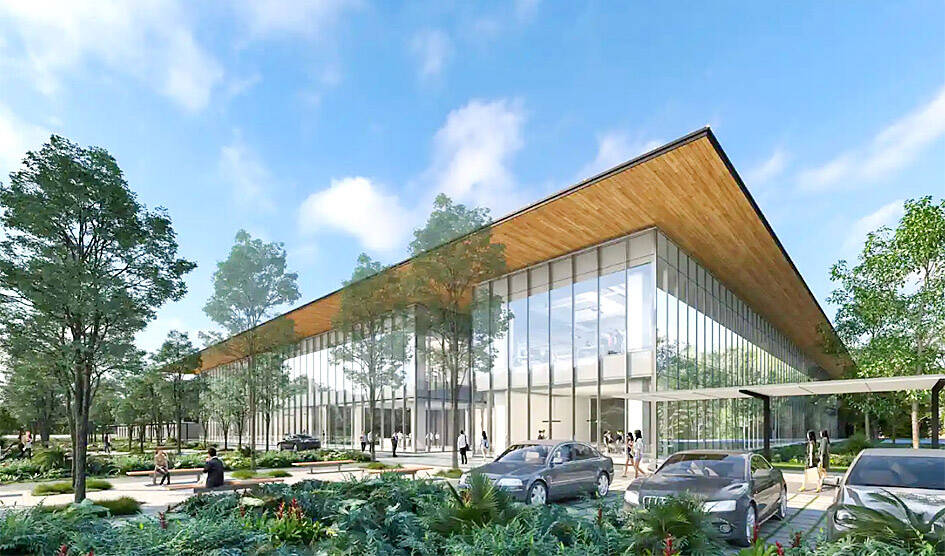High-end appliance maker Dyson Ltd yesterday said that it would open a new factory in Singapore to manufacture next-generation batteries, as well as new facilities elsewhere to boost its research into artificial intelligence (AI) and software development.
At the size of 53 basketball courts, Dyson said the new plant was expected to be fully operational by 2025 and would be its most significant investment in advanced manufacturing.
PROPRIETARY TECH

Photo courtesy of Dyson
The company said research teams had been working globally on proprietary new technology for batteries, which would be assembled in a “smart, digitally enabled environment.”
Dyson — famous for its bagless vacuum cleaners, among other gadgets — started its in-house battery program more than a decade ago, aiming to make them more sustainable and energy dense.
Besides the new plant, the Singapore-headquartered firm also announced plans to set up research and development (R&D) centers in the UK and the Philippines, all part of its £2.75 billion (US$3.4 billion) five-year investment plan.
The company did not specify how much the new battery plant would cost on its own.
FUTURE DRIVERS
The researchers at the new center in the Philippines would focus on AI and robotics, among other areas, and the firm said it intended to hire an additional 450 engineers.
The R&D center in Bristol, England, is expected to be “working on a pipeline of products that stretches 10 years into the future,” the electronics giant said.
“Software, connectivity, AI, and proprietary new technology batteries will power the next generation of Dyson technology,” founder James Dyson said.

With an approval rating of just two percent, Peruvian President Dina Boluarte might be the world’s most unpopular leader, according to pollsters. Protests greeted her rise to power 29 months ago, and have marked her entire term — joined by assorted scandals, investigations, controversies and a surge in gang violence. The 63-year-old is the target of a dozen probes, including for her alleged failure to declare gifts of luxury jewels and watches, a scandal inevitably dubbed “Rolexgate.” She is also under the microscope for a two-week undeclared absence for nose surgery — which she insists was medical, not cosmetic — and is

GROWING CONCERN: Some senior Trump administration officials opposed the UAE expansion over fears that another TSMC project could jeopardize its US investment Taiwan Semiconductor Manufacturing Co (TSMC, 台積電) is evaluating building an advanced production facility in the United Arab Emirates (UAE) and has discussed the possibility with officials in US President Donald Trump’s administration, people familiar with the matter said, in a potentially major bet on the Middle East that would only come to fruition with Washington’s approval. The company has had multiple meetings in the past few months with US Special Envoy to the Middle East Steve Witkoff and officials from MGX, an influential investment vehicle overseen by the UAE president’s brother, the people said. The conversations are a continuation of talks that

CAUTIOUS RECOVERY: While the manufacturing sector returned to growth amid the US-China trade truce, firms remain wary as uncertainty clouds the outlook, the CIER said The local manufacturing sector returned to expansion last month, as the official purchasing managers’ index (PMI) rose 2.1 points to 51.0, driven by a temporary easing in US-China trade tensions, the Chung-Hua Institution for Economic Research (CIER, 中華經濟研究院) said yesterday. The PMI gauges the health of the manufacturing industry, with readings above 50 indicating expansion and those below 50 signaling contraction. “Firms are not as pessimistic as they were in April, but they remain far from optimistic,” CIER president Lien Hsien-ming (連賢明) said at a news conference. The full impact of US tariff decisions is unlikely to become clear until later this month

Nintendo Co hopes to match the runaway success of the Switch when its leveled-up new console hits shelves on Thursday, with strong early sales expected despite the gadget’s high price. Featuring a bigger screen and more processing power, the Switch 2 is an upgrade to its predecessor, which has sold 152 million units since launching in 2017 — making it the third-best-selling video game console of all time. However, despite buzz among fans and robust demand for pre-orders, headwinds for Nintendo include uncertainty over US trade tariffs and whether enough people are willing to shell out. The Switch 2 “is priced relatively high”